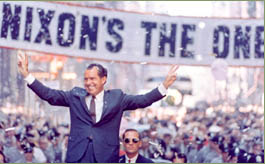 |
|
 |
|
 |
|
Choosing Rehnquist |
|
|
President Nixon had the unusual opportunity to appoint four Supreme Court justices in his first term in office. No Justice would have a greater impact on the Court than the one Nixon selected at the very last minute: William Rehnquist.
|
|
|
 |
|
Bombing for Peace |
|
|
Nixon ran for office in 1968 promising a quick end to the war in Vietnam. By the spring of 1972, Nixon had brought home a half-million American troops, but he had yet to achieve a peace agreement between North and South Vietnam. After North Vietnam launched a major offensive in March, 1972, Nixon made a decision that most advisors thought would only worsen the situation.
|
|
|
 |
|
'Naked To His Enemies' |
|
|
Though Richard Nixon won re-election by a landslide in 1972, his second term was quickly consumed by the Watergate scandal. Evidence of political wrong-doing led closer and closer to Nixon and his two top aides. In April, 1973, Nixon decided to fire them. His calls from that time show a man determined to win, but destined to lose.
|
|
|
 |
|
John Dean Talks About Selecting Rehnquist |
|
| Counsel to President Nixon, John Dean, was one of the few people in the Justice Department to vet candidates for the Supreme Court in 1971. In this interview, Dean gives the background story of how Nixon chose William Rehnquist, and explains why he has some regrets about his own role in the process. |
|
|
The Last Days |
|
| A series of photographs taken of Nixon, Ford, and the White House on Nixon's last three days in office. |
|
|
|
Richard M. Nixon was obsessed with secrecy, both political and personal. But his extensive taping system nearly wiped out his own privacy in the White House.
At first, Nixon was against the idea of secret taping. FBI director J. Edgar Hoover warned Nixon of President Johnson's taping system after Nixon won election in 1968. Historian William Doyle says Hoover advised Nixon: "When you get into the White House, don't make any calls through the switchboard. Johnson has it rigged, and little men you don't know will be listening." The new president ordered every hidden recorder and microphone removed from the Executive Mansion.
But Nixon changed his mind two years later. In February, 1971, the president had more than half a dozen concealed microphones installed in the Oval Office, five in his desk alone, and two more by the fireplace. Within a year, the Cabinet room, Nixon's hideaway office in the Executive Office Building, telephones all over the White House, and Aspen Lodge at Camp David were wired for sound.
Like Lyndon Johnson, Nixon secretly taped his conversations to keep an accurate record for history and, his former aides have said, to track whether what advisors and politicians told him privately matched what they said in public. Unlike Johnson, Nixon's recording system was voice-activated. The president was too clumsy to fumble with an on/off switch. So his recording system ensured that whenever he picked up a phone in the White House, or walked into a room and spoke, hidden mikes captured the sound.
Nixon's secret recordings destroyed his career. His taped conversations about the Watergate scandal revealed Nixon breaking the law and abusing his presidential authority, which led him to become the only U.S. president ever to resign from office.
|

